In this edition
- Nevada State Parks wants visitor feedback to help inform future decisions
- University partners with growers and winemakers to continue research and support educational activities
- Extension and partners ready Nevadans for wildfire season
- 4-H programs impacting youth of all ages in Clark County
- Celebration of Spring with Extension’s Master Gardeners
- Honors, accolades accorded to and appearances by Extension Clark County employees
About our College
A founding college of the University, we have a long tradition of excellence in teaching, research and engagement programs that benefit the health and economic vitality of Nevada. We offer programs in:
- agriculture, horticulture, rangeland & veterinary sciences
- biochemistry and molecular biology
- children, youth & families
- community and economic development
- health and nutrition
- natural resources and environmental science
Nevada State Parks wants visitor feedback to help inform future decisions

Valley of Fire is Nevada’s oldest and largest state park, dedicated in 1935. Photo Credit: Nevada State Parks.
When visitors enjoy Nevada’s 27 state parks this summer, administrators want to hear from them – what they enjoyed about the park they visited, and what could be improved. They also want to know the economic impact the parks are having on Nevada’s communities. The money people spend as a result of recreating in the state’s parks often gets overlooked when looking at the state’s economy. To help gather input from visitors and measure the economic impact of the parks, Nevada State Parks has contracted with University of Nevada, Reno Extension’s Community and Economic Development Program.
“This project supports Extension’s Nevada Economic Assessment Program and the primary goal to collect, manage and analyze data used to support local decision-making processes,” said Extension Community Development Specialist Buddy Borden, whose team is conducting the project. “Under this project, Extension is working statewide in collaboration with Nevada State Parks to collect relevant visitor data and assist with future management decisions.”
Borden says Extension’s Community and Economic Development Program is continually looking for new ways to help serve Nevada’s communities. Those wanting more information can contact him or Extension Economist Joe Lednicky.
Read more about how Extension is helping to gather feedback about Nevada’s state parks
University partners with growers and winemakers to continue research and support educational activities
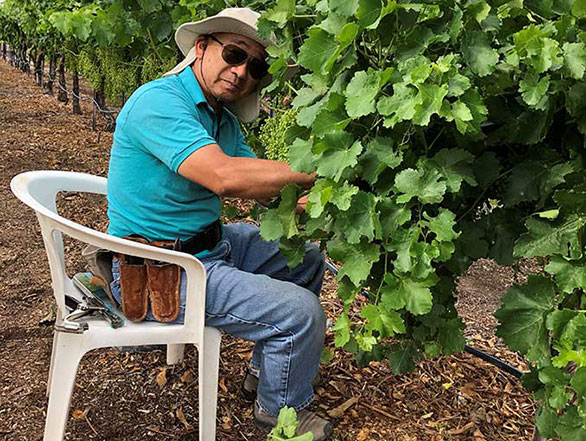
Master Gardener volunteer Yutaka Nomura thins out leaves on grapevines growing at the Research Center & Demonstration Orchard in North Las Vegas. Photo by Louise Ruskamp.
The University has been conducting research on growing wine and table grapes in Nevada for more than 25 years. The research has provided some valuable information for growing grapes in both northern and southern Nevada, as well provided some local wineries with Nevada-grown grapes. The work has been done by the University’s College of Agriculture, Biotechnology & Natural Resources, and its Experiment Station and Extension units, in collaboration with other institutions and local growers and vintners.
In the southern part of the state, the College and its Extension unit are also conducting research on grape growing, in a climate that is of course, much different than northern Nevada.
Extension’s Research Center & Demonstration Orchard, which is part of UNLV’s Center for Urban Water Conservation, currently has over 200 vines consisting of 24 varieties of grapes, most of them being wine grapes. The first grapevines were planted there in 2005 to see which varieties grow well in the southern Nevada climate and are drought tolerant or resistant. As some varieties are tested and don’t do well, they are swapped out to try other varieties.
Read more about the University’s grape research how it is supporting the wine industry
Listen to a recent interview on KNPR about the University’s grape research
Extension and partners ready Nevadans for wildfire season
Extension’s Living With Fire Program is helping Nevadans prepare for wildfire season with workshops on preparedness throughout the state. In May, the program hosted two workshops in Clark County. Both were offered in-person and online.
On May 3 at Extension's Lifelong Learning Center, Living With Fire Outreach Coordinator Megan Kay spoke about how to prepare for wildfire smoke. Kay was joined by Kevin MacDonald from the Clark County Department of Environment and Sustainability, who spoke about ozone, and Melissa Ramos from the American Lung Association in Nevada, who spoke about the health impacts of wildfire smoke.
On May 4, Extension Living With Fire Manager Jamie Roice-Gomes spoke about defensible space and facilitated a community meeting in the Mount Charleston area with local agencies and 32 attendees. She was joined by:
- Fire Chief Mark Regan with NV Energy, who spoke about public safety outage management
- Sergeant Matthew Marlow with the Las Vegas Metropolitan Police Department, who spoke about evacuation preparedness
- Deputy Chief Billy Samuels with the Clark County Office of Emergency Management, who spoke about emergency notifications
- Fire Management Officer Brett Waters with the Nevada Division of Forestry and Raymond Dombroski with the U.S. Forest Service - Humboldt-Toiyabe National Forest, who spoke about fuels reduction and shared stewardship on public lands
- Chief Jorge Gonzalez with the Mount Charleston Fire Protection District and Chief Brian O’Neal with the Clark County Fire Department, who spoke about fire behavior
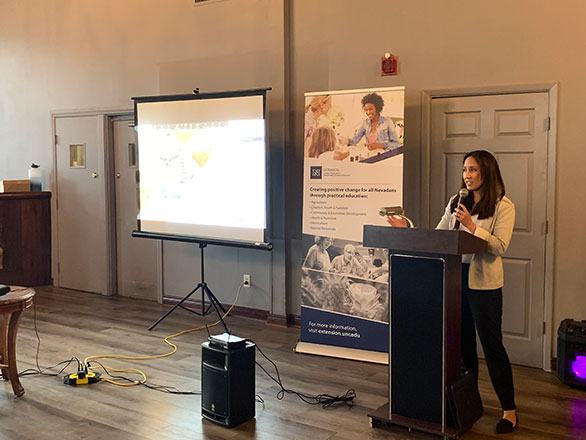
Extension Living With Fire Manager Jamie Roice-Gomes speaks about defensible space at the program's Mount Charleston community meeting May 4.
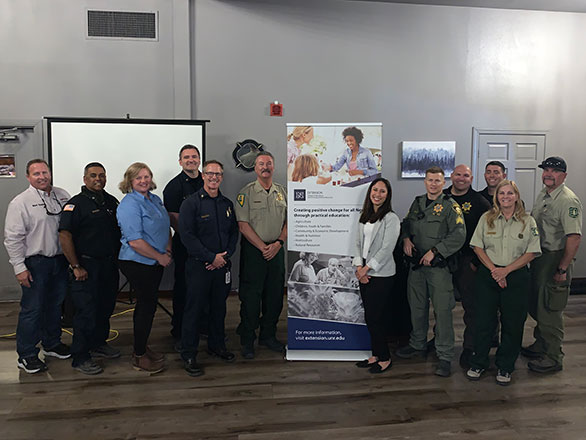
Extension staff and community partners share valuable information during the Living With Fire Program's Mount Charleston community meeting May 4.
READ MORE ABOUT EXTENSION’S LIVING WITH FIRE SESSIONS DURING WILDFIRE SEASON
4-H Programs impacting youth of all ages in Clark County
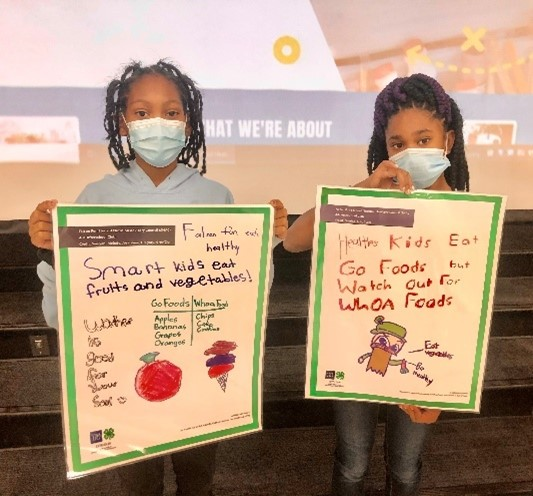 4-H SNAC students at Fitzgerald Elementary School created healthy living posters for their school. These posters promote healthy eating and are displayed in the cafeteria.
4-H SNAC students at Fitzgerald Elementary School created healthy living posters for their school. These posters promote healthy eating and are displayed in the cafeteria.
Extension’s 4-H Program has been busy engaging youth of all ages throughout the Las Vegas area with its 4-H Student Nutrition Advisory Council (SNAC) Clubs and at its 4-H Afterschool Student Program held at Valley High School.
The 4-H Afterschool SNACs are student-led 4-H clubs that promote leadership skills and focus on healthy living, nutrition, physical activity, cooking and public speaking. Members complete youth-driven projects to enhance the school wellness environment. They learn by completing hands-on projects with the guidance of an adult. These projects encourage members to learn how to make good choices, think critically and become leaders.
Extension’s 4-H Afterschool Student Program held at Valley High School recently concluded its first semester of programming. This program is funded by Clark County Extension and a 21st Century Community Learning Center Grant that Extension was awarded in 2021. Extension's Program Coordinator Maria Chairez, Extension 4-H staff, and Valley High School teachers and staff have spent the semester introducing the program to students at Valley High School.
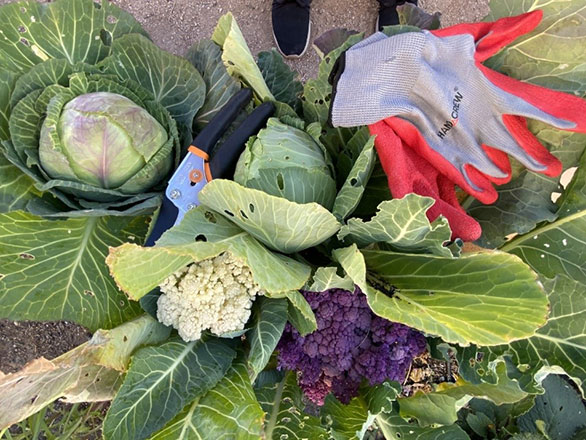
The first time 4-H SNAC Club members at Rex Bell Elementary School cleaned and planted their school garden beds, they planted cabbage, cauliflower and purple cauliflower. Club members harvested from the Coyote Bell 4-H SNAC Club garden beds a couple of months later.
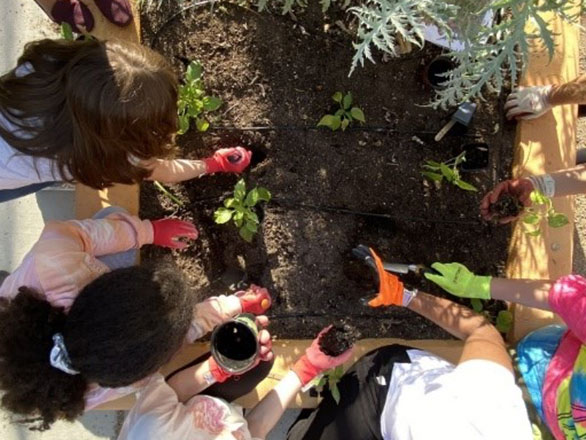
Club members work together to transplant pepper plants.
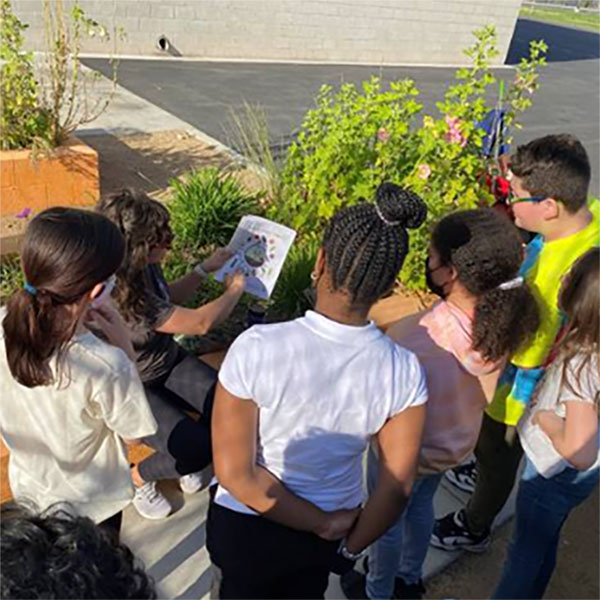
An Extension employee teaches 4-H SNAC Club students about the different parts of plants so the students could transplant plants into their school garden.
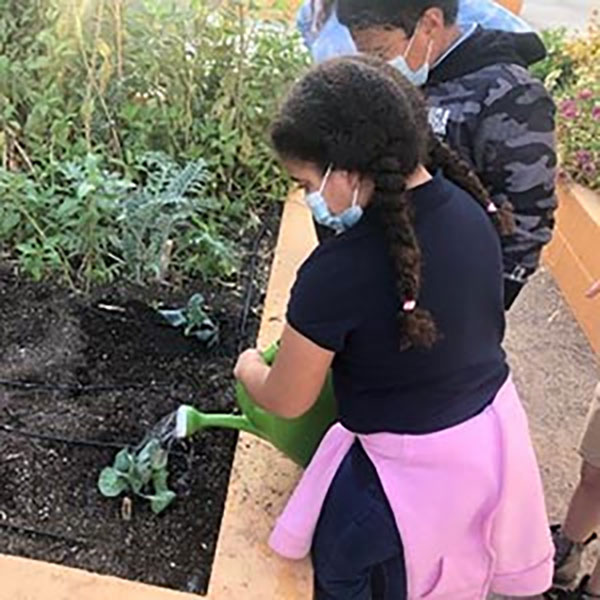
An elementary school student waters her plants with care.
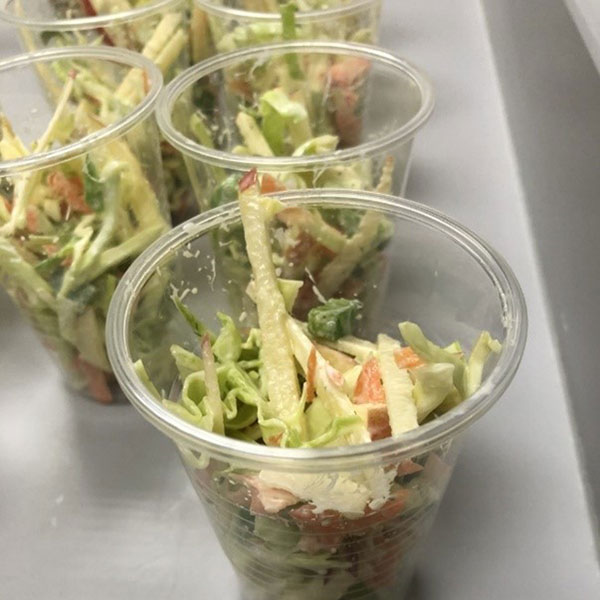
4-H SNAC Club members created apple coleslaw for the students at their school using ingredients from their school garden.
Since February, more than 300 Valley High School students enrolled in 4-H afterschool classes and enrichment activities, which included a unique set of topics such as podcasting, ukulele, cosmetic science, a zen zone, and a pollinator garden. The program also provided space and staff to assist in tutoring sessions and credit-retrieval programs, such as Ingenuity Lab, to provide more opportunities to prepare students for graduation. The program was held daily for two hours and brought in students of all grade levels, including seniors.
Graduating seniors of the program, their families and Valley High School staff were invited to a special 4-H recognition ceremony May 17. In this senior celebration, the class of 2022 received a certificate for their participation in the programs, along with their official 4-H graduation cords.
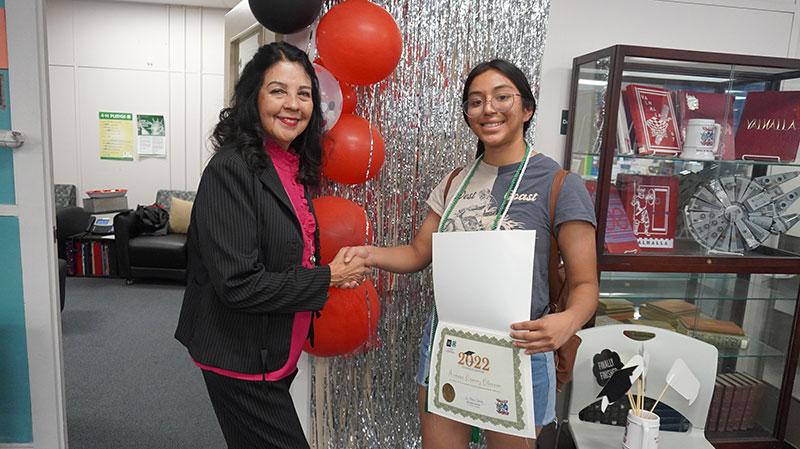
Extension's Program Coordinator Maria Chairez shakes hands with a class of 2022 graduating senior as she is handed her certificate of participation and graduation cords.
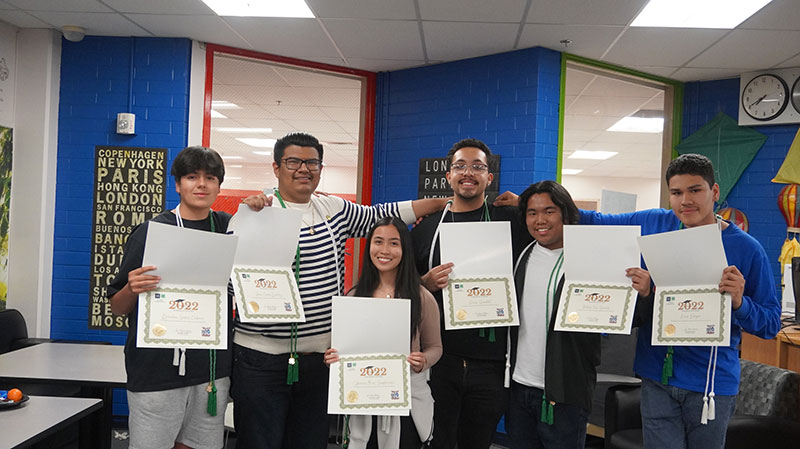
Graduating Valley High School seniors show off their 4-H Afterschool certificates while wearing their 4-H graduation cords.
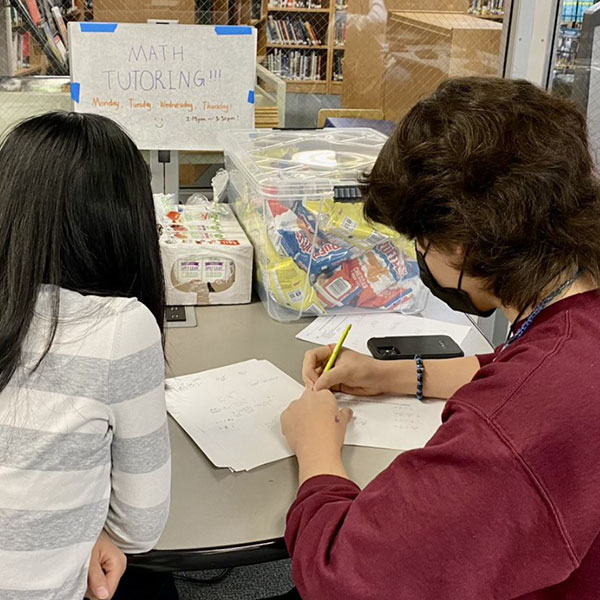
Whether it was to get assistance or help one another, the tutoring section of 4-H Afterschool was a big help to many students.
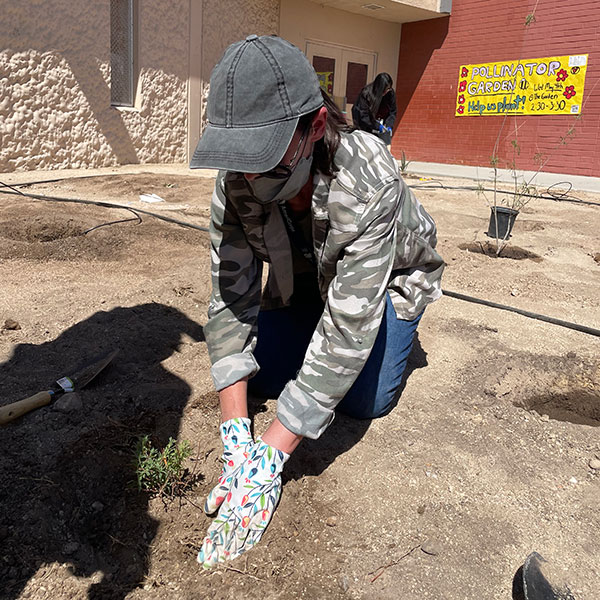
Extension 4-H AmeriCorps member Silvia Frutuoso pats down the soil around her newly planted pollinator garden plant.
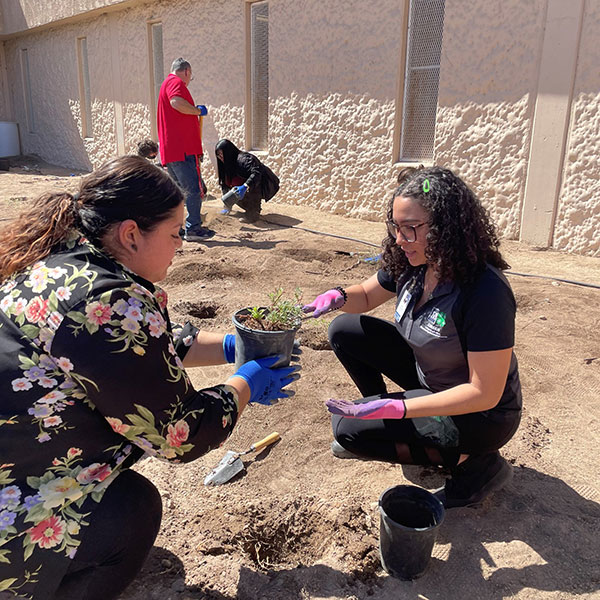
4-H staff members Emily Salazar and Yaritza Ileana Morales work as a team, preparing their desert plant's new home in the garden.
Extension Master Gardeners host Celebration of Spring
After a two-year hiatus caused by the COVID-19 pandemic, more than 100 participants joined Extension’s Master Gardener volunteers at the program's Celebration of Spring event in May.
The horticulture education event, which was held at Extension’s Botanic Gardens located in Clark County, gave attendees the opportunity to admire the hard work of Master Gardener volunteers and for those volunteers to share their knowledge with gardeners from the Las Vegas Valley. As eventgoers enjoyed the Botanic Gardens, they also had the opportunity to ask questions; learn about horticulture topics, such as native plants, home composting and fruit-tree care; and attend live demonstrations.
A rose show co-hosted by the South Valley Rose Society was held in the garden’s butterfly pavilion. The event culminated with a mad hatter-themed tea party that was presided over by Extension State Specialist and Professor M.L. Robinson.
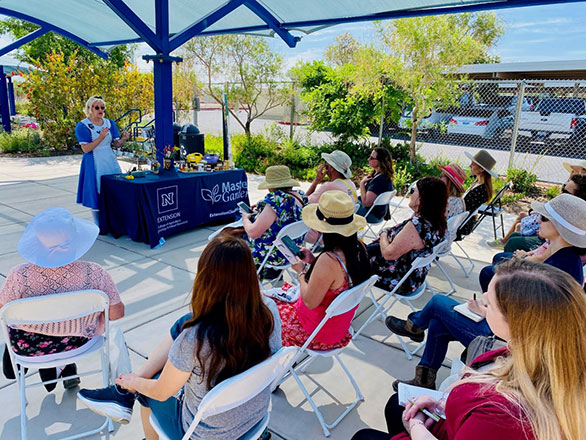
Extension Master Gardener Gail Brandys gives a presentation about desert native plants.
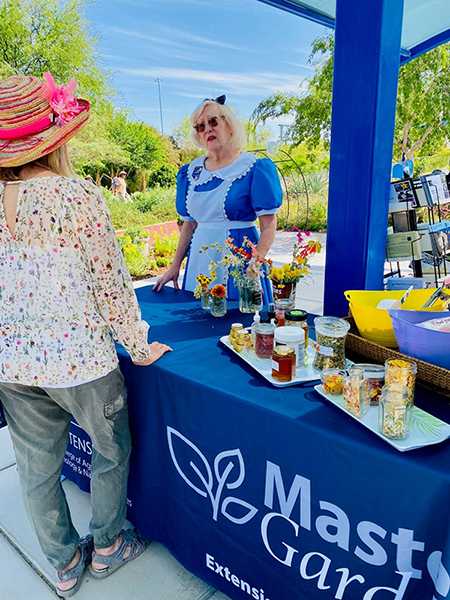
Extension Master Gardener Gail Brandys educates visitors about native desert plants.
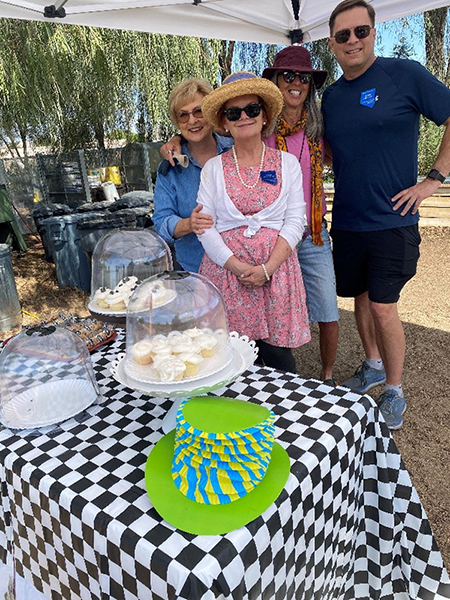
The Mad Hatter tea party table was set up by Extension Master Gardener Joann Defelici and her catering crew.
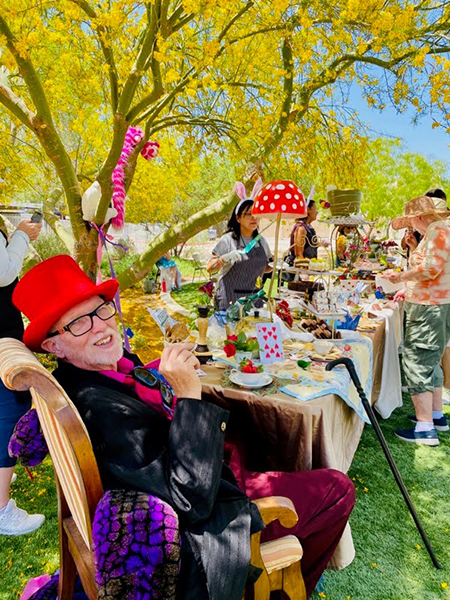
Extension State Specialist and Professor M.L. Robinson sits near the tea party table as visitors grab tea fare.
Honors, accolades accorded to and appearances by Extension, Clark County employees
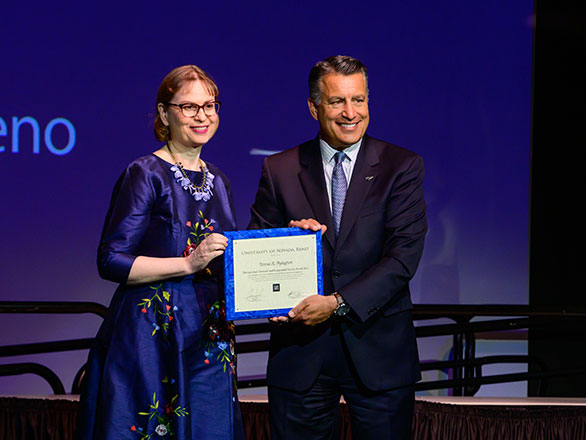
Extension State Specialist and Professor Teresa Byington receives her award from University of Nevada, Reno President Brian Sandoval.
Teresa Byington, professor and specialist in early childhood education at University of Nevada, Reno Extension, received the Distinguished Outreach and Engagement Faculty Award from University of Nevada, Reno President Sandoval at the Honor the Best ceremony.
This award is given in recognition of her vision, dedication and leadership in outreach and engagement. The award acknowledges her outstanding work in providing outreach and engagement programs that benefit the citizens of Nevada and provide opportunities that build a culture encouraging lifelong learning at the University and in society as a whole.
During her tenure, Byington has received over $9.2 million in external funding; published 17 journal articles, two books and 58 peer-reviewed publications; and given 78 presentations at state, national and international conferences. Her comprehensive workforce preparedness program for early childhood professionals provides participants with opportunities for discovery and engagement.
"One of the most rewarding outcomes of my outreach activities has been seeing young children’s faces light up as they participate in self-directed learning experiences that allow them to be innovative and creative,” Byington said.
Additionally, Tricia Braxton Perry, who serves as coordinator for Extension’s Youth Horticulture Education and Domestic Violence High-Risk Team Programs, was awarded the Diversity, Equity and Inclusion award at the College of Agriculture, Biotechnology & Natural Resources' annual awards ceremony. This award recognizes the exceptional work of an individual in advancing the values of inclusion, equity and diversity.
Braxton Perry leads her team in reaching diverse youth with equitable community-based education, securing the funding to do so and presenting at national conferences to expand their reach. The curricula that she developed focuses on connecting youth to horticulture knowledge and experiential learning opportunities that increase an awareness of science-related garden technology careers.
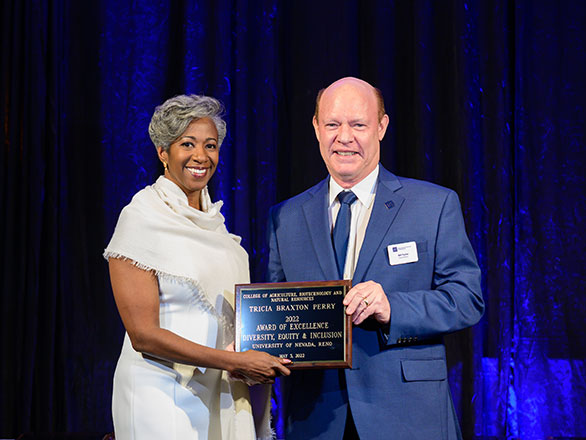
Extension Coordinator Tricia Braxton Perry receives the Diversity, Equity & Inclusion Award from College of Agriculture, Biotechnology & Natural Resources Dean William Payne.
She also builds community partnerships that extend the reach of Extension's programs into diverse communities, including those with the Clark County School District and its Connecting Hands Offering Lifelong Learning Adventures Committee, Acelero Head Start, and the Department of Juvenile Justice Services. As a result, her program's participants are as diverse as the county it serves.
Braxton Perry recently earned her doctorate of public policy from the School of Public Policy at UNLV.
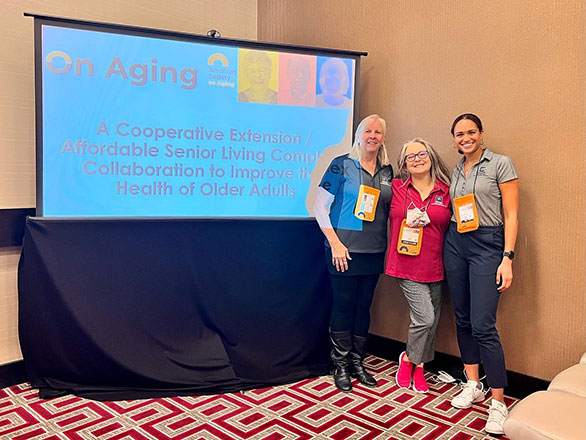
Left to right, Extension State Specialist and Professor Anne Lindsay, Extension Healthy Aging Engagement Coordinator Natalie Mazzulo and Extension SNAP-Ed Coordinator Macy Helm pose before presenting at the American Society on Aging.
In addition to Byington and Braxton-Perry’s awards, Clark County Extension employees Martha Barajas and Kylie Russell, and Master Gardener volunteer Ralph Sgamma received Extension Awards of Excellence this year. Read more about the College awards.
Extension State Specialist and Professor Anne Lindsay, Extension Healthy Aging Engagement Coordinator Natalie Mazzullo and Extension SNAP-Ed Coordinator Macy Helm recently presented at the American Society on Aging Conference.
Their session provided a replicable model to improve access to and appeal of healthy eating and physical activity through USDA SNAP-Education-funded interventions in income-restricted senior living complexes. This model serves as a conduit for experts and academic faculty in the field of aging to improve the health of low-income older adults by establishing an environment that promotes informed decision-making around diet quality and physical activity.
Extension Community Based Instructor Nicole Hansen recently took Best of Class and Champion for the Community-School Garden category at the Clark County Fair for the Youth Horticulture Education Program's entry with English breakfast radishes, culinary rosemary and lemon thyme.
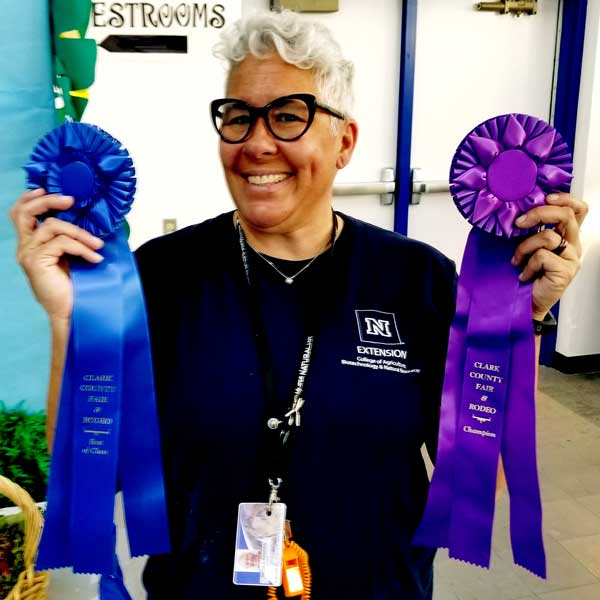
Extension Community Based Instructor Nicole Hansen shows off her fair ribbons.
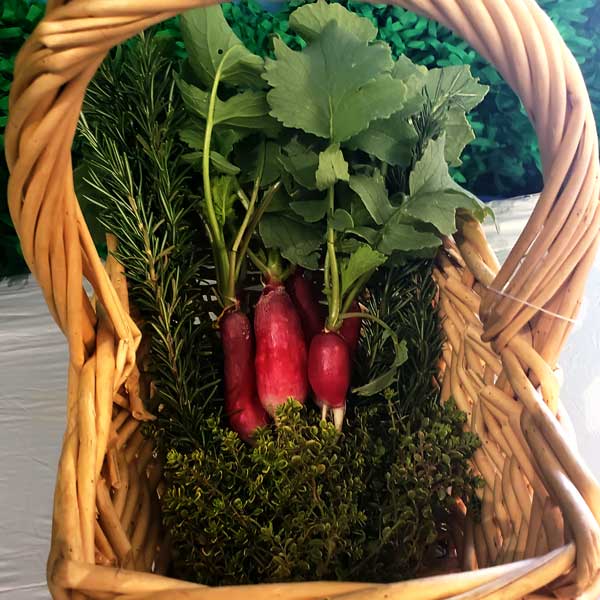
The fair entry featured English breakfast radishes, culinary rosemary and lemon thyme.


